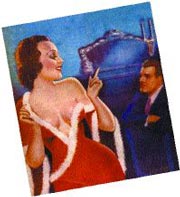“I couldn’t go, and I couldn’t stay the way things were,” says the hero of The Postman Always Rings Twice of the troubled times that beset him when a murder plot goes awry. That pretty much sums up how I’m feeling at the moment, torn between conflicting impulses for national safety and international peace. Maybe that’s the reason why, as this lighthearted season of giving begins, I can’t think of a better gift than James M. Cain’s dark fiction. Famous for his hard-boiled novels, Cain excels at shading his characters’ ethical dilemmas in a thousand hues of gray. His criminals have good hearts, his decent-seeming folks harbor dark ambitions, and, above all, his people do the wrong things for all the right reasons.
Cain’s creations were best-sellers in the ’30s and ’40s, and it’s a testament to their staying power that they’re still in print. Still, the number of people who have seen the film versions of his books and never bothered to read the originals always surprises me; his slim novels offer pleasures the silver screen can’t touch. His knack for revealing characters in a few simple lines makes reading sheer pleasure, his compelling pace draws you along effortlessly, and, as one plot twist morphs into the next, he manages to keep the resolution just out of reach.
Of course, his plots aren’t the only things that tantalize: Few people write about sex better than Cain. His first book, The Postman Always Rings Twice (1934), the tale of a sexy, growling drifter who sets his sights on a married woman, has such graphic scenes that it was tried in a Boston court for obscenity. The raw power of his erotic writing is still enough to make anyone gasp—or start screaming, “Bite me, Bite me,” as Postman‘s frustrated wife, Cora, famously does when drifter Frank starts to kiss her.
While Cain’s sex scenes run hot, his characters can be incredibly cold-blooded. In Double Indemnity, an icy blonde dupes a decent (if horny) insurance salesman into committing murder and then betrays him afterward. The book makes a great read, although some think that the screenplay for the 1944 film version written by Raymond Chandler and director Billy Wilder makes an even better one; Cain himself once said that it was superior. Of all Cain’s novels, how-ever, my personal favorite is Mildred Pierce (1941), the story of an ambitious mother who earns a fortune on a fried- chicken-and-waffles restaurant and is viciously betrayed by her calculating daughter. With its heftier page count and slow, simmering pace, Mildred Pierce feels more like a novel than Cain’s shorter books. And if you think reading the novel is pointless because you’ve seen the 1945 film (famous for Joan Crawford’s Academy Award-winning performance), think again—the screenplay is quite different from the original. Only in the pages of the book is it clear that Mildred’s daughter, Veda, takes the prize as Cain’s most frosty femme fatale.
It’s been 10 years since I joined the cult of Cain, that seedy underbelly of noir lovers who scoff at contemporary crime, keep his dog-eared novels within arm’s reach at all times, and spend evenings gloating over the classic films he inspired. His books have al-ways felt like talismans to me, with their empathetic portrayal of people in conflict and the way they confront the complex juncture of right and wrong. Let’s face it: The world is a dark place full of tangled morality and difficult choices, and our actions have repercussions that we can’t expect. Nobody knew that better than Cain.
Get It?
New paperback editions of DOUBLE INDEMNITY ($8) and THE POSTMAN ALWAYS RINGS TWICE ($9) are available at the Elliot Bay Bookstore (101 S. Main, 624-6600). MILDRED PIERCE, only available in a 1989 edition ($13), can be ordered there or at Amazon.com.
The film DOUBLE INDEMNITY ($15.99) is available at Suncoast Motion Picture Company (Westlake Center, 343-7491). THE POSTMAN ALWAYS RINGS TWICE (1946 version) and MILDRED PIERCE (both $19.99) can both be ordered at Amazon.com.









